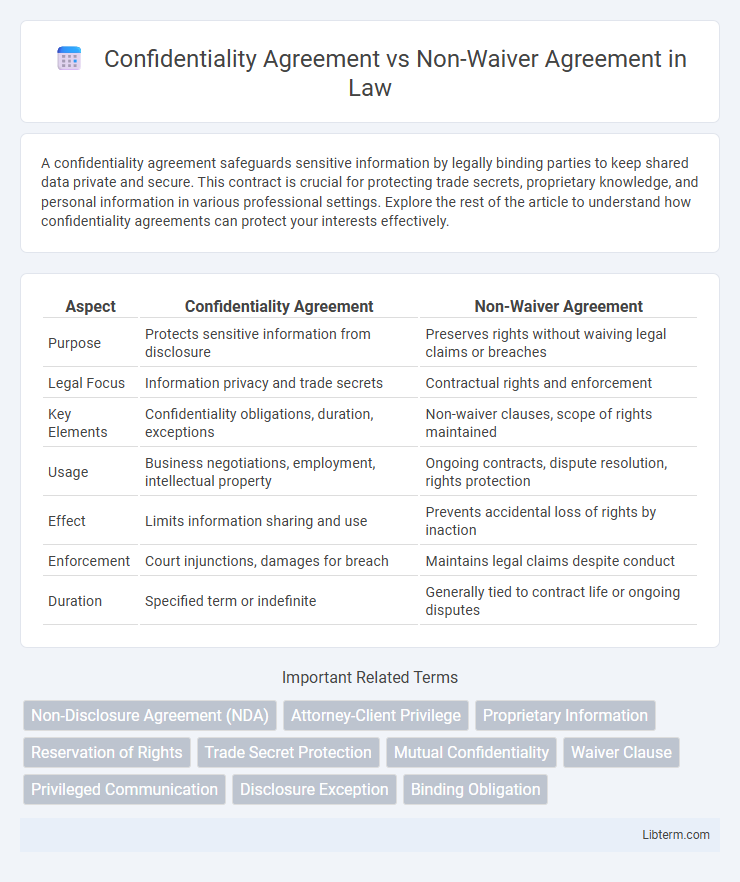A confidentiality agreement safeguards sensitive information by legally binding parties to keep shared data private and secure. This contract is crucial for protecting trade secrets, proprietary knowledge, and personal information in various professional settings. Explore the rest of the article to understand how confidentiality agreements can protect your interests effectively.
Table of Comparison
| Aspect | Confidentiality Agreement | Non-Waiver Agreement |
|---|---|---|
| Purpose | Protects sensitive information from disclosure | Preserves rights without waiving legal claims or breaches |
| Legal Focus | Information privacy and trade secrets | Contractual rights and enforcement |
| Key Elements | Confidentiality obligations, duration, exceptions | Non-waiver clauses, scope of rights maintained |
| Usage | Business negotiations, employment, intellectual property | Ongoing contracts, dispute resolution, rights protection |
| Effect | Limits information sharing and use | Prevents accidental loss of rights by inaction |
| Enforcement | Court injunctions, damages for breach | Maintains legal claims despite conduct |
| Duration | Specified term or indefinite | Generally tied to contract life or ongoing disputes |
Introduction to Confidentiality and Non-Waiver Agreements
Confidentiality agreements protect sensitive information by legally binding parties to keep shared data private, preventing unauthorized disclosure. Non-waiver agreements ensure that parties do not lose legal rights or claims even if they temporarily overlook or delay enforcing certain contract provisions. Both agreements serve distinct roles in maintaining trust and protecting interests in commercial relationships.
Defining Confidentiality Agreements
Confidentiality Agreements, also known as Non-Disclosure Agreements (NDAs), are legal contracts established to protect sensitive information shared between parties during business relationships or negotiations. These agreements define the scope of confidential information, impose obligations on recipients to maintain secrecy, and specify consequences for unauthorized disclosure. Unlike Non-Waiver Agreements, which prevent parties from relinquishing contractual rights, Confidentiality Agreements focus exclusively on safeguarding proprietary data and trade secrets.
Defining Non-Waiver Agreements
Non-Waiver Agreements specifically ensure that parties do not relinquish any pre-existing rights or claims by engaging in certain actions or communications during a negotiation or dispute resolution process. Unlike Confidentiality Agreements, which primarily protect sensitive information from disclosure, Non-Waiver Agreements focus on preserving legal positions and preventing implied waivers. These agreements are crucial in maintaining the enforceability of rights while allowing open dialogue or provisional measures without altering original legal obligations.
Key Differences Between Confidentiality and Non-Waiver Agreements
Confidentiality agreements protect sensitive information from unauthorized disclosure, ensuring parties maintain secrecy about shared data or business secrets. Non-waiver agreements affirm that a party's failure to enforce certain rights or terms does not constitute a waiver of those rights, preserving legal protections despite inaction. The key difference lies in confidentiality agreements focusing on information protection, whereas non-waiver agreements address the preservation of contractual rights and obligations.
Legal Purposes and Objectives
Confidentiality Agreements are designed to protect sensitive information by legally binding parties to non-disclosure, ensuring proprietary data remains secure during business transactions or collaborations. Non-Waiver Agreements serve to preserve contractual rights by explicitly stating that a party's failure to enforce certain terms does not constitute a waiver of those rights in the future. Both agreements are crucial legal tools: Confidentiality Agreements safeguard information confidentiality, while Non-Waiver Agreements maintain the enforceability of contractual provisions.
Common Clauses in Confidentiality Agreements
Confidentiality agreements typically include common clauses such as definition of confidential information, obligations of the receiving party, term and duration of confidentiality, exclusions from confidentiality, and remedies for breach. These clauses establish clear boundaries for the use and protection of sensitive information exchanged between parties. Non-waiver agreements, by contrast, focus more on preserving rights and do not usually contain such detailed confidentiality provisions.
Common Clauses in Non-Waiver Agreements
Non-Waiver Agreements commonly include clauses that explicitly state the preservation of all rights under a contract despite any delays or partial performance, ensuring that no party inadvertently waives their contractual entitlements. Key provisions often outline that the failure to enforce any term does not constitute a waiver of future rights and specify the duration of the non-waiver effect. These agreements may also incorporate remedies clauses, emphasizing that any concession or forbearance cannot be interpreted as relinquishing the right to enforce obligations later.
When to Use Each Agreement
A Confidentiality Agreement is used when parties need to protect sensitive information from being disclosed during business discussions or collaborations, ensuring trade secrets and proprietary data remain secure. A Non-Waiver Agreement is appropriate when parties want to clarify that any failure to enforce rights or breach of contract does not waive those rights or obligations in the future. Use a Confidentiality Agreement during negotiations involving private information and a Non-Waiver Agreement when maintaining the enforceability of contract terms despite temporary leniency is crucial.
Legal Risks and Implications
A Confidentiality Agreement safeguards sensitive information by legally binding parties to non-disclosure, reducing the risk of intellectual property theft and unauthorized information sharing. A Non-Waiver Agreement prevents parties from unintentionally relinquishing their rights or claims, ensuring that a failure to enforce contractual terms does not imply consent or waiver, thereby protecting legal leverage. Both agreements address different legal risks: Confidentiality Agreements focus on information protection, while Non-Waiver Agreements secure ongoing enforcement rights, minimizing potential disputes and preserving contractual integrity.
Choosing the Right Agreement for Your Needs
Selecting between a Confidentiality Agreement and a Non-Waiver Agreement depends on the specific legal protections required; a Confidentiality Agreement safeguards sensitive information from unauthorized disclosure, while a Non-Waiver Agreement ensures that a party's rights are not inadvertently relinquished during negotiations or contract execution. Businesses handling proprietary data or trade secrets typically favor Confidentiality Agreements to maintain competitive advantage, whereas parties involved in ongoing contract discussions prioritize Non-Waiver Agreements to preserve contractual rights without conceding obligations. Understanding the nuanced applications and legal implications of each agreement type is essential for tailored risk management and effective contractual relationships.
Confidentiality Agreement Infographic

 libterm.com
libterm.com